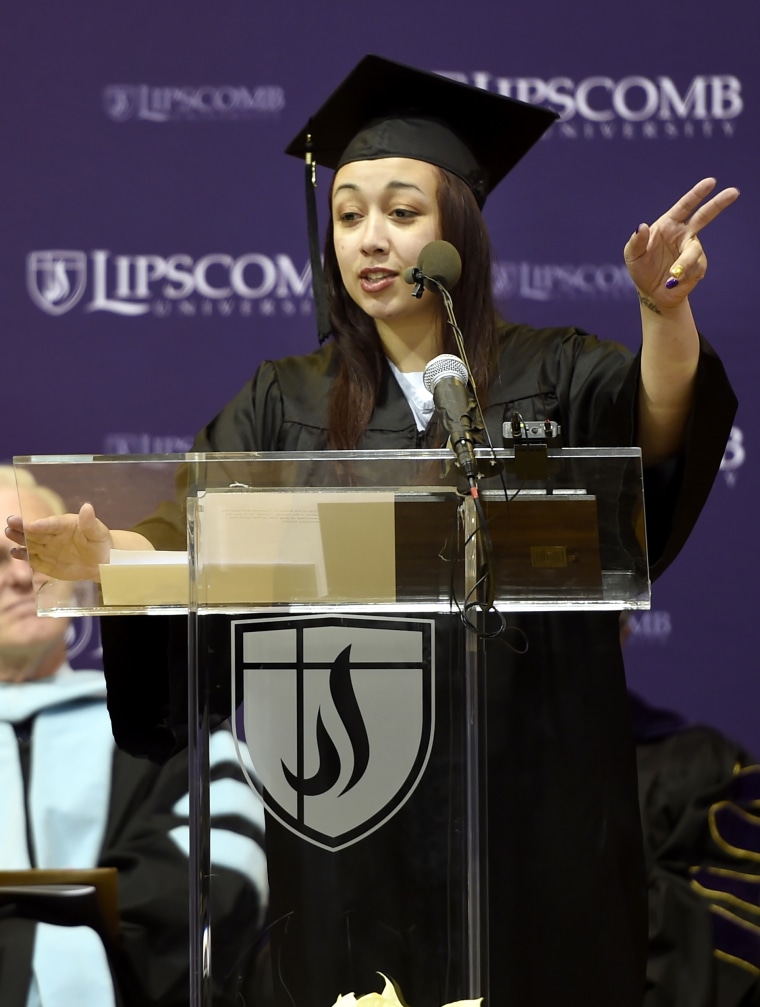NASHVILLE, Tennessee — "I do pray that you show mercy and that you give me a second chance," Cyntoia Brown said recently as she sat before a parole board behind the walls of the Tennessee Prison for Women.
Brown, now 30, was sentenced to life in prison for murder when she was 16, with no chance for parole until she serves 51 years. Her case has become a national rallying point for activists trying to reform the criminal justice system and raise awareness about the toll of human trafficking.
Brown will get another opportunity to make her case for leniency this week. A U.S. federal appeals court in Cincinnati has agreed to hear oral arguments about whether her sentence is fair. Her attorneys are expected to point to recent Supreme Court rulings declaring mandatory life sentences for minors without the possibility of parole as being unconstitutional.
As it stands now, she will be 69 by the time she's eligible for parole. Her supporters say that is much too long.
Tennessee’s appeals court has upheld Brown’s sentence. And the state's lawmakers, unlike in other states, have refused to change the law.
“She has demonstrated her accountability and served her time,” said Cathy Gurley of You Have the Power, one of two Tennessee victim’s rights group supporting Brown’s plea for clemency. She said Brown’s case is the first time in 25 years her group has backed an inmate.

Brown admits to shooting and killing a Nashville man named Johnny Allen, who she claims had picked her up for sex. Brown insists she’d been forced into prostitution, and that she shot Allen in self-defense while the two were together in his bed.
“I have a college degree now. I have a family ... a whole community of people who love me, who believe in me, who support me,” Brown told the board on May 23.
But just a few feet away sat friends of the man she murdered.
"This was not a case of self defense," said Anna Whaley holding up a grainy autopsy photo of Allen’s bullet riddled body. "Johnnie’s life mattered. Johnnie was loved and he is missed dearly."
Whaley and prosecutors said Brown was a cold-blooded killer who robbed her victim. The arresting officer at the time, Detective Charles Robinson of the Nashville Police, told the board there’s no evidence Brown was a prostitute. “Show me the proof,” he said at the hearing.
Brown’s cries for justice also have been heard by a number of celebrities like Kim Kardashian West, Rihanna and LeBron James, who have called for her release on social media and rallied with the tag #freecyntoiabrown. Hundreds of thousands of people have signed petitions for Brown's freedom online.
Kardashian West recently convinced President Donald Trump to pardon a grandmother serving a life sentence for a nonviolent drug offense. She did not respond to NBC News' requests for comment on Brown's case.
Her story inspired a documentary film, “Me Facing Life: Cyntoia’s Story,” which attracted worldwide attention. The film by Daniel H. Birman begins in the hours right after Brown was arrested. It reveals and explores the physical and emotional abuse Brown endured throughout her life that she and her supporters believe eventually led her to commit murder. Much of the film is Brown telling her story in her own words.
Dr. William Bernet, a professor of psychiatry at Vanderbilt University’s School of Medicine, was called in to evaluate Brown 14 years ago, right after she was arrested, and has recently interviewed her again.
“She did it knowingly, purposefully, but she did not premeditate the murder,” he said.
Bernet argues Brown is guilty of second-degree murder, which would make Brown eligible for release based on time served right about now, he said.
"Juveniles think differently. They act differently, their brains are made up differently from adults, and I think that has to be taken into consideration when sentences are given,” Bernet said.
Brown is not alone. Across the country, according to the Sentencing Project, some 2,300 prisoners currently behind bars were sentenced to life in prison, without the possibility of parole, when they were minors. Another 7,300 are serving life with parole only a possibility after 15 to 50 years.
“The U.S. stands alone as the only nation that sentences people to life without parole for crimes committed before turning 18,” wrote Josh Rovner of the D.C.-based advocacy group.
Brown told the board repeatedly that she's sorry for the crime. "I’m not saying I deserve anything. I’m asking for mercy," she said. "I’m telling you that I am a completely different person."
But after several hours of extremely emotional testimony from dozens of advocates for Brown, the parole board was utterly divided. Two said they’d recommend Gov. Bill Haslam grant her clemency. Two turned down her request. And two said Brown should serve 25 years instead of 50 before becoming eligible for parole. That would mean at least 11 more years in prison.
Haslam has never granted clemency to an inmate and, being term-limited, will leave office early next year. NBC News reached out to him but he declined to comment. A decision, if any, is not expected until the end of the year, just before his term ends
So for now, Brown and her supporters hope a federal court gives her some measure of relief, as her fight for justice continues behind prison walls.